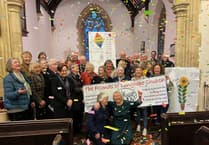THE remains of three unknown British soldiers thought to be a part of the "Glorious Glosters" regiment who fought at the Battle of Imjin 70 years ago have been buried with full military honours at a national ceremony in South Korea.
In a service at the United Nations Cemetery in Busan, Korea on Armistice Day (November 11), the unknown men, who were found near to where the battle was fought, were laid to rest in one of many events held to mark the 70th anniversary and honour the ’Glosters’ regiment, which included several men from the Forest.
The burial was attended by South Korean Prime Minister Kim Boo-kyum and other members of his Government, along with British Ambassador Simon Smith, UK Military Attaché Brigadier Michael Murdoch and MP Mike Freer, the UK Trade Minister.
A team from the Ministry of Defence’s Joint Casualty and Compassionate Centre are now tracing family members of missing ’Glosters’ to match their DNA samples with the remains.
Around a dozen of the national servicemen in the ’Glosters’ battalion were from or had links to the Forest of Dean, and a special concert was performed by the Royal Forest of Dean Orchestra in Parkend last month to commemorate the anniversary.
The concert was attended by the last surviving Imjin veteran from the Forest, Mr Roy Mills of Cinderford, and plans for a lasting memorial to those who fought were also announced.
The Battle of Imjin, which was fought in April 1951, was a defensive battle in which a UN peace keeping force fought against the North Korean and Chinese Armies during the Korean War.
Although the forces were heavily outnumbered, they held up the Chinese army sufficiently to allow UN forces to regroup and prevent the fall of Seoul.
Two of the Forest of Dean soldiers in the battalion were in ’A Company’, which continuously engaged in the most ferocious part of the battle.
The Glosters battalion was awarded the US Presidential Citation following the battle, while Colonel Carne was awarded the Victoria Cross and several other soldiers were decorated for their gallantry and actions.
The majority of the battalion that weren’t killed during the battle spent the next two years in a prisoner of war camp, being interrogated, tortured and resisting political indoctrination.
Among those captured were David Haines, from Littledean, and Derrick Richards, from Mitcheldean, who met up after the war and remained close friends in the years that followed.
South Korea has regarded the battle as a key event in safeguarding democracy in the country and has expressed a debt of gratitude to the UK and Gloucestershire on numerous occasions.
Chris Ryland, chairman of the Soldiers of Gloucestershire Museum, commented: "It is poignant that in the same year we commemorate the 70th anniversary of the Battle of Imjin River, we can also celebrate the sacrifice made by these three unknown casualties from the battle.
"The legacy of these soldiers will live on and we are delighted they will receive full military honours and the attendance of such esteemed members of the Korean community."
The Joint Casualty and Compassionate Centre team is hoping to match up the graves of those buried with names on the Imjin Roll of Honour.
Researcher Nicola Nash explained: "Due to the location of where the remains were found it’s been suggested that they could be Gloucestershire regiment so that’s the point that I started looking at all the Gloucestershire regiment men that had been listed as missing".
So far, the team has collected and analysed 35 DNA samples but none have been a match, with around 15 families still being traced.




